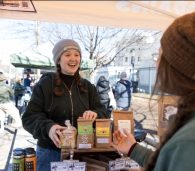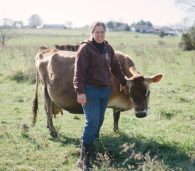A Message from Hugo Mogollon on Diversity at FRESHFARM
Black-owned businesses in our network have shared their direct experience about the lack of diversity in our markets. They have brought to light the lack of transparency in our vendor selection process, specifically for the Dupont Circle market. I am here, in solidarity, to speak to these experiences.
Since last Thursday, we have listened to the people who have been excluded. We are looking inward to understand how and why we have fallen short in making the market platform accessible to all and in particular Black people and people of color. As we move into a new chapter for FRESHFARM, with my leadership, we commit to addressing the concerns this important discussion has raised by 1) clarifying and sharing our vendor selection process, 2) publicly sharing the regulations and guidelines by which vendors must adhere, and 3) ensuring our organization is anti-racist in its direction, strategy, and structure.
We also recognize the need for immediate changes, ones that can be part of a longer-term and more systemic transformation at FRESHFARM. This week, we worked with the City to modify our COVID-19 waiver, which regulates the way our markets operate during the emergency pandemic, to expand the market. As a result of the City’s willingness to modify the waiver, we are now able to add four Black-owned businesses to the Dupont Circle Farmers Market starting this Sunday, June 21: Dodo Farms, Fight Juice, Sexy Vegie, and Puddin’. This response is the first step, but our commitment to change will be widespread and longer-lasting. We will be continuously sharing details with the public about our approach over the next few months.
While this immediate action affects the Dupont Circle Market — the oldest and highest-grossing market — FRESHFARM also manages markets in Wards 1, 2, 4, 5, 6, and 7, as well as Northern Virginia and Montgomery County, Maryland. All FRESHFARM markets are designed to be a home for vibrant, thriving businesses. We will continue to be committed to connecting farmers with underserved communities, as those markets help our mission of making fresh, healthy food more accessible for all.
With our Pop-Up Food Hub, FRESHFARM has proven to be effective in creating solutions that serve people and businesses historically excluded from the local food system. We have implemented programs that educate and strengthen our most vulnerable children with FoodPrints. Our markets have supported family farms before “local food” was even a concept. Our work benefits thousands of people across the food system. But we also know that we need to do more, especially when it comes to working against racism internally and in the food system. We commit to continuing these efforts and look forward to collaborating with members of the Black community in crafting solutions. I hope you will accept my and FRESHFARM’s genuine commitment and join us in this new chapter for our organization.
You can see a theory of change here that will inform our actions, and we have divided our plan into three stages:
Stage 1 (4 weeks)
- Analysis of internal practices
- Define limiting practices and future goals
- Engage with the Board of Directors and external professionals to build anti-racism, inclusiveness, and equity into our strategic plan
Stage 2 (3 months)
- Train our staff and Board on racial equity and anti-racism
- Seek partnerships and coalitions that will help us to diversify our market vendors
- Define actions and strategies
Stage 3 (ongoing)
- Plan implementation
- Set up regular check-ins with external experts to assess racial equity and anti-racism
- Permanent improvement and reporting outcomes
We are committed to acknowledging the effects of racism in the food system, addressing any and all structural racism in our organization, and listening to the voices of those vendors most impacted by disparity.
Many of you have joined FRESHFARM in a quest to achieve our mission for more than two decades. We couldn’t be here without that support. We have the power to create change, and with you, we hope to emerge as a stronger organization, community, and local food system.
Hugo Mogollon
Executive Director


